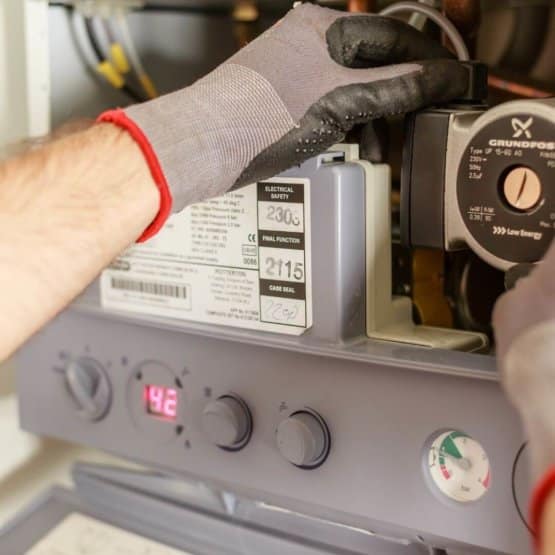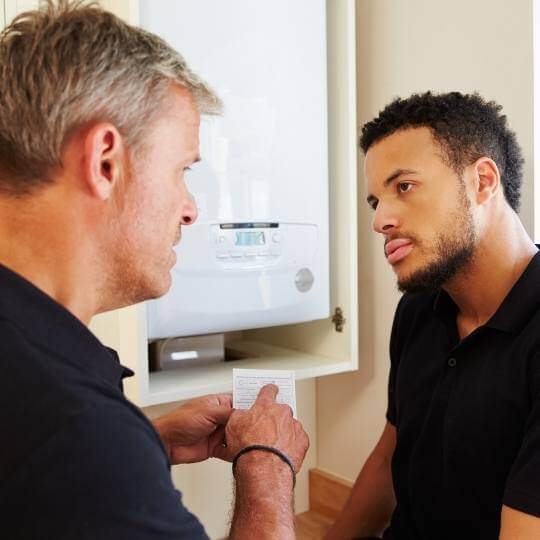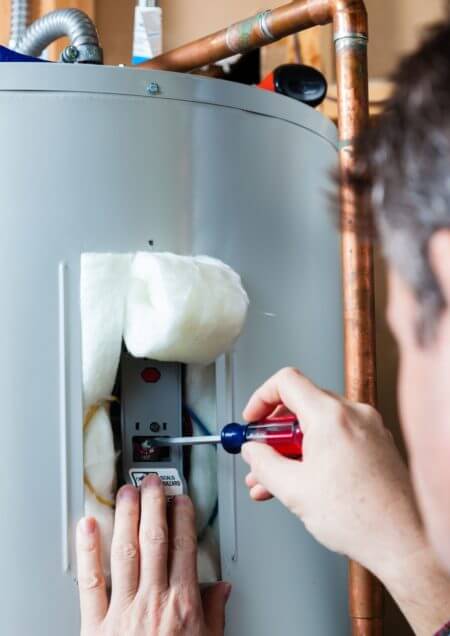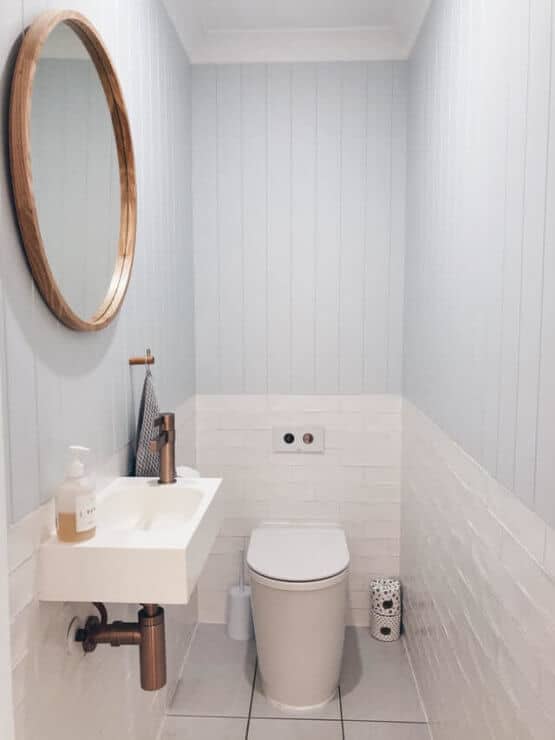Most people have found themselves in the shower waiting for the hot water to come but without any luck. This is hugely frustrating, especially if you’ve just come back from a tiresome trip and want to shower. Luckily, most of these issues can be solved by yourself.
There’s no need to call the plumber and waste a lot of money on something you could fix. There are many reasons why your water heater keeps turning off, depending on its type.
An amateur could solve some; others do require professional help. Here are some of the more common ones.
Reasons Why Gas Water Heater Keeps Turning Off

Gas water heaters are becoming more and more popular in the latest years. This is because of their energy efficiency and affordable price. Here are a few possible reasons why your gas water heater keeps turning off.
1. Gas Supply
Gas water heaters need to have a flow of gas to the pilot light in order to remain working. If the gas supply is blocked, or if the amount of gas isn’t sufficient, the pilot light won’t stay lit.
Make sure the line valves are open. This is the only way to ensure the gas reaches the pilot light.
Related: Will a Gas Water Heater Work Without Electricity
2. Dirty or Dusty Pilot Light Burner
As we’ve mentioned before, pilot light is a necessary part of a gas water heater. If your gas water heater keeps turning off, maybe the problem lies in the dirty pilot light burner.
When there is dust or dirt on the pilot light, it will turn off, which will shut down your entire heater. This is because dirt will prevent airflow.
It is recommended to call your plumber to help you clean out the debris. The cleaning process isn’t too simple, so you shouldn’t do this by yourself.
You can always re-light the pilot light, but this will only cause the problem to re-appear. In the end, your entire heater may malfunction, which will leave you with more expenses than it should have.
3. Broken or Dirty Thermopile
Thermopile is the part of the heater that responds to the pilot light and turns on the gas. Similarly to the pilot light, the thermopile can also malfunction if it’s worn out or dirty.
If it can’t signal properly, the water heater won’t start working, even if the pilot light is working.
Luckily, a thermopile can easily be replaced, and a new part is relatively cheap. Once again, though, we’d recommend calling the plumber for this task. [1]
4. Dirty Air Inlet
Another part of the gas water heater that is sensitive to dirt and dust is the air inlet. Air inlet makes sure the air can flow to the main burners.
If it’s clogged, oxygen can’t reach the lamps, and they will turn off. The best way to prevent this issue is to have your heater regularly maintained.
If the air inlet does get clogged, a plumber can clean it up without too much hassle. [2]
Reasons Why Electric Water Heater Keeps Turning Off

Electric water heaters are a standard in most homes. Typically, they won’t break down as often as gas heaters, but malfunctions still may occur.
If your electric water heater keeps turning off, here are some things you need to know.
All electric water heaters have a similar electronic system, so luckily, you won’t have many options. A heater’s electronic system is composed of these three parts:
- An electrical outlet,
- A thermostat,
- A heating element.
Any of these three parts can malfunction, and prevent the water from heating.
-
Broken Electricity Source
The electrical outlet is the central part of the heater’s electrical system. This is what leads the electricity towards the rest of the unit.
Sometimes, this may be the cause of a water heater that keeps turning off. Keep in mind that a broken electrical outlet can be a severe issue.
If you hear a buzzing or cracking sound when you turn the heater on, turn it off immediately. You don’t want to create a short circuit or even an explosion in worst case.
Contact an electrician as soon as possible, as this can cause severe damage.
-
A Bad Thermostat
A thermostat is what’s managing the heating elements. Once the water becomes cold, the thermostat sends the signal to the heating elements.
This will cause your water to re-heat. Once the water is at the temperature you desire it to be, the thermostat will turn off the heating element.
If you have an HVAC or hybrid system, you’ll notice this is similar to the air conditioning thermostat.
Most electric water heaters have two thermostats, an upper and a lower one. This is because there are two heating elements, and both require a thermostat.
However, just like with any other part, they can malfunction. When this happens, sometimes they’ll get stuck on the ‘off’ settings.
This way, your heater won’t work correctly, and it won’t warm up the water. The only fix to this is to replace the broken thermostat.
This has to be done by a plumber, as it’s dangerous to mess with anything that works on electricity.
- Heating Element Malfunction
A heating element is what heats the water once the thermostat signals it. This is the most common culprit when your hot water heater keeps turning off.
Once the heating element malfunctions, it will stop warming up the water.
If the heat source is down, the water in the tank will stay cold, even if everything else is working great. A plumber should always replace heating elements.
If it’s installed wrongly, it can also lead to a short circuit, causing serious damage.
How Can You Troubleshoot Electric Heater Problems?

If you have an electric water heater, you probably wonder, ‘Why my water heater keeps turning off?’ Knowing why your electric heater malfunctioned can save you a lot of money in the long run.
Here’s how you can troubleshoot problems with your electric heater.
- First off, you have to turn off the power. This is important as it will provide safety.
- Then, make sure the power isn’t what’s causing the issue. Make sure that there are no tripped circuit breakers. If a fuse is blown, replace it. This will rule out the problems with the power outlet.
- The next step is to make sure if the thermostat is working. If the power reaches it and everything is working correctly, it will measure the water temperature.
- If it’s faulty, then the thermostat needs to be replaced. If both of these two elements are working correctly, then the cause is a malfunctioned heating element.
- Sometimes, the heater might be working, but the water can’t reach the desired temperature. This can be caused by several problems, such as a water heater that is undersized.
- Make sure your heater has 75% hot water capacity.
- The following thing you should check are possible crossed cold and hot connections. Turn off the water supply and turn on the faucet on the hot water settings.
- If the water is flowing, this means that crossed connections are the problem.
- Simultaneously, problems with the electrical system may be what’s causing your water not to heat up properly. If the undersized heater or crossed connections aren’t an issue, check the system as we’ve already explained.
- Lastly, always make sure your heater doesn’t have too much mineral build-up inside of it. Sediment can cause the elements to stop working properly, and this simple issue can easily be solved. You don’t even have to contact a professional for it!
Signs You May Need a New Heater
Sometimes, enough is enough. If your water heater keeps turning off, no matter how many times you’ve fixed it, it’s time for a change. Older models typically have a longer lifespan, even though they aren’t working as efficiently as newer ones. Here are some warning signs that calling a repairman is money thrown away:
- Your heater is older than 10 years – 10 years is the lifespan of most heaters. If your heater is older than this, it’s near its end.
- Leaks – If you find water around the tank, it’s probably fractured. You can repair this for a short period of time. However, fractures tend to expand in size.
- Noise – If you hear a lot of noise coming from your heater, you probably have a lot of sediment build-up. Even though build-up can be cleaned, this is usually the sign you need a new unit.
- Large hot water bills – Unexpectedly large bills can be a sign of a malfunction. If you are using your heater like you usually do, but the bills are higher, there is some issue. This is typically the sign that the heater needs to be replaced.
- Water heater keeps turning off repeatedly – If you have done everything you can, but the water keeps being cold, it’s time for a new start. Get rid of maintenance bills and buy a new water heater.
Read Also: Water Heater Sound Like a Jet Engine
Bottom Line
When your water heater keeps turning off, it’s essential to know what’s causing it. It is always recommended to call a plumber, but you should be educated on the topic.
You don’t want to spend more money on diagnosing the issue than on repairing it. Also, on some occasions, the reason behind a problem may be something simple.

Michael Davis is a heating & plumbing expert who currently works as independent contractor in SC. He also writes for Plumbertip.
For almost 10 years he worked on various plumbing tasks across South Carolina.


